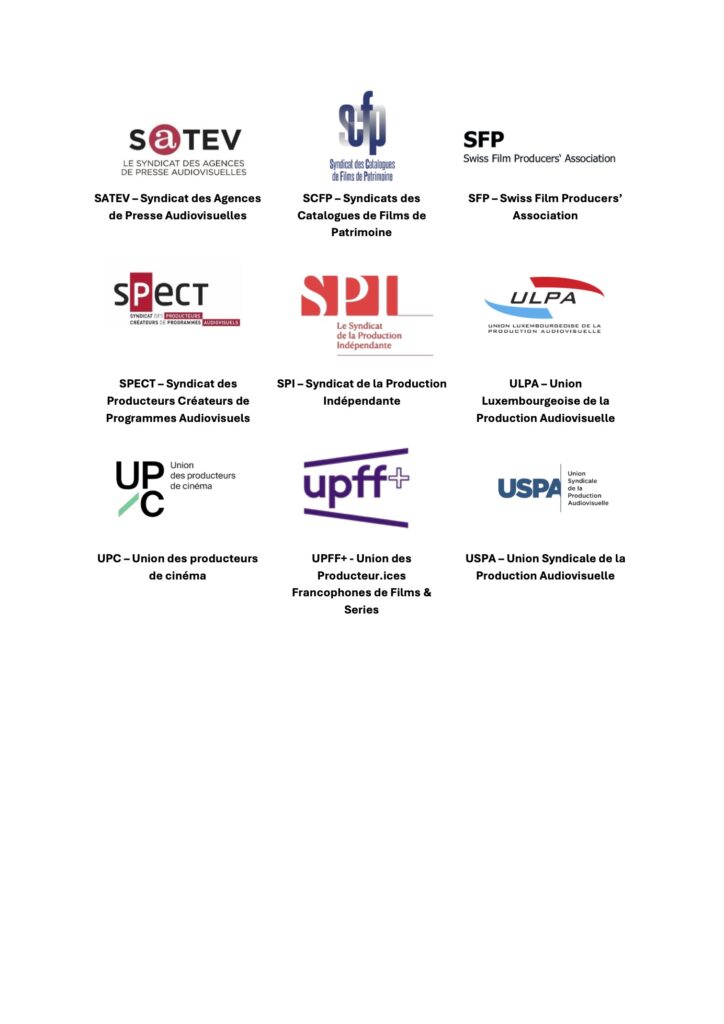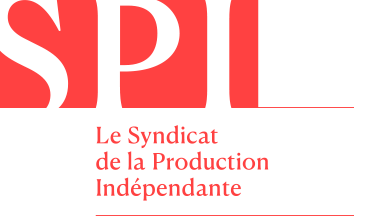Les producteurs indépendants européens appellent à conserver une réglementation ambitieuse pour préserver la culture, la démocratie et la liberté de création
Télécharger le Communiqué de presse 👉 https://lespi.org/wp-content/uploads/2025/05/Press-Release-Independent-Production-Charter.pdf
The independent production charter
- The audiovisual sector in Europe is a place where freedom of creation and expression are a powerful tool for safeguarding our democracy.
- Strong and careful regulations are needed in our sector to build ambitious and open cultural policies.
- Wearecompetitive:weembodyamajoreconomicsectorwithstrongsoftpower, attract top talent, and thrive under policies that champion the diversity of creative voices.
- Weareanecosystemcomposedofflexibleandindependentallsizeeconomic actors that are the most efficient tool for diversity and artistic boldness.
Therefore, we support the following principles for the years to come:
Within the current political context, it is essential that measures be taken at EU level to actively promote cultural diversity — particularly in light of the upcoming 2026 review of the AVMS Directive. Any potential revision should focus on cultural policy objectives and be carried out through a directive. This would allow and encourage each state to adopt and develop tailored national cultural policies while ensuring that independent producers maintain their exploitation and ownership rights over the works they create and produce.
As for AI and in order to protect human creation and intellectual property rights, we support the charter that has been elaborated for the AI summit by EU organizations.


Conférence de presse – Discours de Simon Arnal – Président du SPI
pavillon du SPI – 15 mai 2025
🇫🇷
Nous sommes ici à Cannes pour partager avec le monde entier toutes les cinématographies qui illustrent la grande richesse de nos cultures, de nos points de vue construits par nos histoires, celles des talents, auteurs, réalisateurs, acteurs, musiciens, techniciens, producteurs du monde entier.
Ce qui nous rapproche, c’est cette certitude que la diversité de nos cultures est précieuse.
Elle est gage de liberté, de liberté de création, de pluralisme de pensée, d’indépendance.
La diversité culturelle régulée est un pilier démocratique en Europe et elle doit être préservée et entretenue.
C’est le choix qui est fait en Europe depuis le siècle dernier et ça marche !
La régulation européenne de la diversité culturelle réaffirmée sans cesse depuis les accords du GATT dans les années 90, nous a permis de construire des écosystèmes robustes, capables de s’adapter aux évolutions économiques, technologiques, tout en offrant au public toujours de nouvelles formes d’émerveillement, de connaissance et d’usages.
Alors, comment ça marche ? Toutes cette régulation par les directives européennes que chacun des pays peuvent adapter à leur marché permettent un système vertueux et simple et gagnant-gagnant : Ceux qui veulent toucher nos publics, nos marchés, travailler avec nos talents, y participent en investissant dans des productions locales et en partenariat avec la production indépendante européenne.
Pourquoi ? parce que la production indépendante, permet une plus grande créativité, le renouvellement des talents, nécessaire à tout l’écosytème, la circulation optimale des œuvres et la souveraineté de nos droits à travers la conservation des IP européennes.
La France n’est pas une exception, et elle a initié une relation gagnant-gagnant avec les US, dès la fin de la guerre, en lui permettant d’accéder à notre marché tout en participant à la création avec une taxe prélevée sur le billet de cinéma, puis elle a suivi le chemin de la régulation européenne avec des principes forts : respect du droit d’auteurs, diffusion de la diversité de la création européenne, obligation d’investissement adapté en fonction des pays (directive et pas règlementation) et respect de l’exception culturelle. Aujourd’hui, la France est le 2eme marché pour les plateformes US qui signent avec nous des accords interprofessionnels afin de produire des œuvres ‘locales’, qui valorisent ainsi leurs propres revenus. C’est un cercle vertueux.
Les attaques de ceux qui veulent déréguler ne sont pas nouvelles, elles sont constantes depuis des décennies, au nom de la modernité, de la loi du marché, de la construction de champions économiques, de la meilleure circulation des œuvres en Europe qui devrait nous conduire à lever tout principe de territorialité et de régulation de nos relations.
Depuis des décennies nous avons montré qu’au contraire l’Europe s’adapte à toutes les évolutions par une régulation qui promeut l’éthique, la transparence, la participation de tous à la construction de valeurs culturelles communes dans leur diversité.
Nous n’avons pas changé et nous ne changerons pas notre ouverture aux cultures tant américaines qu’européennes ou d’ailleurs.
Les barrières douanières incompréhensibles de Mr Trump vont avant tout pénaliser le cinéma américain, qui est basé pour au moins 50% sur l’exportation.
Les streamers américains avec lesquels nous rappelons que nous avons signés des accords convergents dans un intérêt commun, ont besoin de l’Europe. Nos marchés leurs sont essentiels.
Plus que jamais, la régulation culturelle et la réaffirmation de la place centrale du producteur indépendant garant de cet écosystème précieux, vertueux, performant, et qui rayonne ici et dans de nombreux festivals dans le monde est nécessaire.
Elle assure aussi une indépendance éditoriale et une diversité des œuvres et des structures qui est fondamentale pour notre sécurité démocratique. Europe creative doit aussi tenir compte de cette ambition avec des budgets revus à la hausse. Une directive SMA qui doit réaffirmer la place de la diffusion des œuvres européennes sur les services numériques, le caractère absolument vertueux du principe de régulation par la loi du pays visé par un diffuseur global.
Je suis fier que les producteurs indépendants du SPI (pardon mais nous sommes ici au SPI) totalisent 58 sélections à cette édition du festival, souvent en coproduction avec nos partenaires européens.
Et je suis extrêmement fier d’avoir parmi nous, le producteur de FLOW, Ron Dyens, de Sacrebleu Production, récompensé par l’Oscar du meilleur film d’animation en février dernier pour une coproduction Letonne-franco-Belge, mais aussi par le prix du public européen LUX, un Golden globe, un César du meilleur film et tant d’autres récompenses. Ce film est la parfaite illustration de la réussite de ce modèle, tout comme Emilia Perez ou le film de Justine Triet l’an passé, pour ne citer qu’eux.
Nous appelons les institutions Européennes et les Gouvernements européens à ne renier en aucune manière le principe d’exception au libre commerce de notre culture qui ne sera jamais un bien comme un autre.
🇬🇧
We are here in Cannes to share with the whole world all the films that illustrate the great richness of our cultures, our perspectives shaped by our stories, and the talents of writers, directors, actors, musicians, technicians, and producers from around the world.
What brings us together is the certainty that the diversity of our cultures is precious.
It is a guarantee of freedom, creative freedom, pluralism of thought, and independence.
Regulated cultural diversity is a pillar of democracy in Europe and must be preserved and maintained.
This is the choice that has been made in Europe since the last century, and it works!
European regulation of cultural diversity, which has been constantly reaffirmed since the GATT agreements in the 1990s, has enabled us to build robust ecosystems capable of adapting to economic and technological changes, while offering the public ever new forms of wonder, knowledge, and uses.
So how does it work? All this regulation through European directives, which each country can adapt to its own market, creates a virtuous, simple, win-win system: Those who want to reach our audiences, our markets, and work with our talents participate by investing in local productions and partnering with European independent production companies.
Why? Because independent production allows for greater creativity, the renewal of talent, which is necessary for the entire ecosystem, the optimal circulation of works, and the sovereignty of our rights through the preservation of European IP.
France is no exception, and we initiated a win-win relationship with the US at the end of the war, allowing it access to our market while participating in creation through a tax on cinema tickets. We then followed the path of European regulation with strong principles: respect for copyright, dissemination of the diversity of European creation, obligation to invest according to country (directive and not regulation) and respect for cultural exception. Today, France is the second largest market for US platforms, which sign interprofessional agreements with us to produce “local” works, thereby increasing their own revenues. It is a virtuous circle.
The attacks by those who want to deregulate are not new; they have been constant for decades, in the name of modernity, market forces, the creation of economic champions, and the better circulation of works in Europe, which should lead us to abandon all principles of territoriality and regulation of our relations.
For decades, we have shown that, on the contrary, Europe adapts to all developments through regulation that promotes ethics, transparency, and the participation of all in the construction of common cultural values in all their diversity.
We have not changed and we will not change our openness to cultures, whether American, European, or elsewhere.
Mr. Trump’s incomprehensible « tariffs » will firstly penalize the American film industry, which is based on exports for at least 50% of its financing.
The American streamers, with whom we have signed agreements in the common interest, need Europe. Our markets are essential to them.
More than ever, cultural regulation and the reaffirmation of the central role of independent producers, who are the guarantors of this precious, virtuous, and successful ecosystem that shines here and at many festivals around the world, are necessary.
It also ensures editorial independence and diversity of works and structures, which is fundamental to our democratic security. Creative Europe must take this ambition into account with increased budgets. An SMA directive that must reaffirm the place of European works on digital services and the absolutely virtuous nature of the principle of regulation by the law of the country targeted by a global broadcaster.
I am proud that the independent producers of the SPI (sorry, but we are here at the SPI) have a total of 58 selections at this edition of the festival, often in co-production with our European partners.
And I am extremely proud to have among us the producer of FLOW, Ron Dyens, from Sacrebleu Production, who won the Oscar for Best Animated Film last February for a Latvian-French-Belgian co-production, as well as the European LUX Prize, a Golden Globe, a César for Best Film and many other awards. This film is the perfect illustration of the success of our model, as are Emilia Perez and Justine Triet’s film last year, to name but a few.
We call on European institutions and European governments not to renounce in any way the principle of exception to the free trade of our culture, which will never be a product like any other.

Commentaires récents